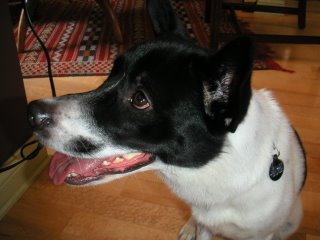Dog Lover Smackdown: Cesar vs. Some Guy I Don't Know
“His [Milan's] mantra is “exercise, discipline, affection,” where discipline means “rules, boundaries, limitations.” Rewards are absent and praise scarce, presumably because they will upset the state of calm submission Mr. Millan wants in his dogs. Corrections abound as animals are forced to submit or face their fear, even if doing so panics them.”
God forbid any being in 21st century America be subjected to “rules, boundaries, and limitations.” From what I can tell, Millan suggests praising dogs when they are in a calm state rather than when they are hyped up and scatterbrained in order to reinforce behavior that is enjoyable to be around, making the dog a more likely target of affection in the future. If Derr wants to hug and kiss his dog while she terrorizes passersby he may, but he penalizes the nearby stranger. Doing so reminds me of parents who “reinforce” their kids’ loud and obnoxious attention getting circus acts in restaurants by telling their children over and over to "stop it" without consequences while ignoring them when their behavior is comendable. Whatever, I’m not a parent either.
Rewards are not exactly absent from Millan’s methods. He merely suggests that dogs probably find the time they spend with you and your obvious delight in them more rewarding than we might expect, and that perhaps food need not always be handed out for things dogs should be doing automatically as a part of the family unit. Not to go back to thinking of dogs as humans again, but doesn’t all of this sound sort of like a parenting philosophy debate?
Regarding cranky dogs:
More important, aggression often has underlying medical causes that might not be readily apparent — hip dysplasia or some other hidden physical ailment that causes the dog to bite out of pain; hereditary forms of sudden rage that require a medical history and genealogy to diagnose; inadequate blood flow to the brain or a congenital brain malformation that produces aggression and can only be uncovered through a medical examination. Veterinary behaviorists, having found that many aggressive dogs suffer from low levels of serotonin, have had success in treating such dogs with fluoxetine (the drug better known as Prozac).
Being more in the Brooke Shields rather than the Tom Cruise camp, I’m fine with dogs taking Prozac. Derr believes that Millan advocates aggression toward aggressive dogs by occasionally flipping an out of control dog on to its back, something that happens to out of line dogs in the wild. But in fact, Millan suggests that if your dog is aggressive you should consult a professional, period. And he says never to hit or even yell at a dog. Hitting is abusive. Yelling just confuses your dog or worse, makes him think you’re ecstatic about his painstaking efforts to shred your early American hand-hooked rug, as demonstrated by Claire’s wagging tail when I've mistakenly roared at her in the past.
Reading Derr’s article I almost sense irritation that an "uncredentialed" doggie Dr. Phil is getting more attention than he should. Degrees are important I suppose. The article mentions none of Derr’s qualifications, however, so it is hard to know why he might be more trustworthy than Millan. Derr didn’t really include any information about how whatever school of thought he subscribes to counters Millan’s ideas either, so it is difficult to argue with his points. Derr does make the excellent point that each dog has specific needs, a fact that someone might potentially ignore if one relied only on Millan’s methods. Though when you see a chihuahua chilling with a recently deadly Rotweiler at Cesar's palace, it's hard for me to believe each dog's needs are not being met.
I also got the sense that Millan's actions look “mean” to behaviorist who focus on not hurting a dog’s feelings, not a goal of mine I can assure you. But Millan’s arguing for spending more actively engaged time with your dog, communicating what is expected of them in ways they understand, and providing stabilizing affection seems like common sense to me. I could be missing something, but the fact remains that Derr hasn’t managed to make a 45-minute walk with our dog more fun for her and us. Cesar has.
A more important difference between Derr and Millan, is that Derr seems to be about dogs. As John puts it, “The Dog Whisperer isn’t about dogs. It’s about humans.” Millan’s work forces people to examine what role their own issues are playing in their dog’s problems—New agey? Touchy feely? Maybe, but as far as I’m concerned, anything that causes humans to reflect on and own up to the effect their own actions have on others seems likely to improve the world for both dogs and humans.












